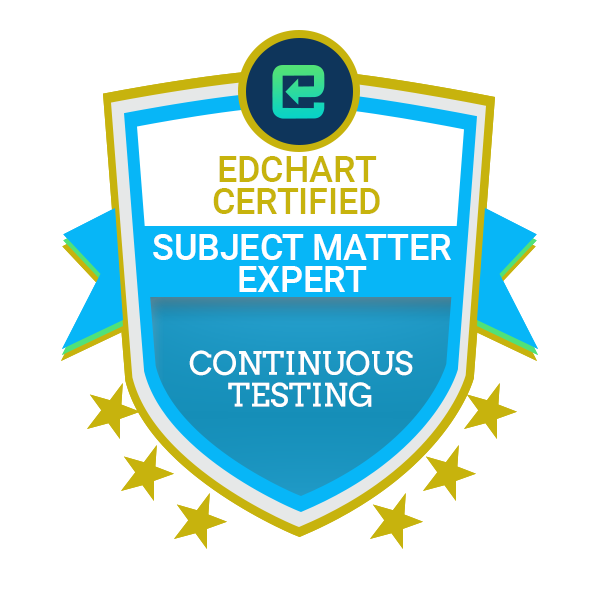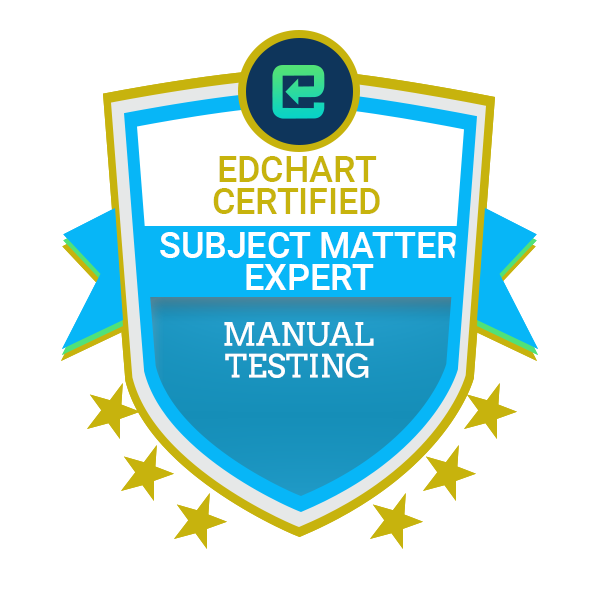
Edchart Certified
Continuous Testing SME
The Continuous Testing Certification focuses on empowering professionals with the tools, techniques, and frameworks needed to implement continuous testing processes within Agile and DevOps environments. This certification enhances your ability to automate test cases, integrate testing into CI/CD pipelines, and ensure software quality across multiple development cycles. Participants will learn about the nuances of Continuous Integration, Continuous Delivery, and testing in production environments. Upon completion, you'll be equipped with skills that enable businesses to reduce time-to-market while maintaining high standards of quality assurance.
Continuous Testing Certification | continuous testing | continuous testing in devops | datadog continuous testing | continuous testing tools | continuous integration testing | digital ai continuous testing | continuous testing tools in devops | continuous testing software | continuous performance testing | continuous integration automated testing | continuous testing datadog | agile continuous testing | continuous integration testing tools | continuous integration and testing | continuous test automation | automated continuous testing | automated continuous integration | azure devops continuous testing | continuous deployment testing | continuous api testing | continuous testing framework | continuous testing pipeline | devops continuous testing tools
| India: |
|
|---|---|
|
Other Countries: |
|
Unlock Your Potential with Continuous Testing Certification
In today's fast-paced software development environment, Continuous Testing has emerged as a crucial practice for ensuring quality and speed. The Continuous Testing Certification validates your skills and knowledge in implementing continuous testing strategies. This certification is essential for professionals who aim to excel in the realm of DevOps and agile methodologies.
What is Continuous Testing Certification?
The Continuous Testing Certification focuses on integrating testing into the continuous integration and continuous delivery (CI/CD) pipeline. This approach allows teams to deliver high-quality software at a rapid pace, ensuring that each code change is tested immediately. The certification covers various testing methodologies, tools, and best practices, equipping professionals with the necessary skills to implement effective testing strategies.
Skills Required for Continuous Testing Certification
To succeed in obtaining the Continuous Testing Certification, candidates should possess a mix of technical and soft skills, including:
-
Understanding of CI/CD Pipelines: Familiarity with CI/CD processes and tools such as Jenkins, Git, and Travis CI.
-
Testing Frameworks: Knowledge of various testing frameworks and tools, including Selenium, JUnit, and TestNG.
-
Scripting Skills: Proficiency in scripting languages like Python or JavaScript for automation testing.
-
Analytical Thinking: Ability to analyze testing results and identify potential issues.
-
Collaboration Skills: Strong communication skills to work effectively with development, QA, and operations teams.
These skills ensure that certified professionals can effectively integrate testing into their development processes and maintain high software quality.
Scopes of Continuous Testing Certification
The Continuous Testing Certification opens up a variety of career opportunities across different industries. Professionals certified in this area can pursue roles such as:
-
Quality Assurance Engineer: Ensuring that software products meet quality standards.
-
DevOps Engineer: Facilitating collaboration between development and operations teams.
-
Automation Tester: Developing and executing automated test scripts.
-
Software Developer in Test (SDET): Combining programming and testing skills to enhance software quality.
-
Continuous Integration Specialist: Implementing and managing CI/CD pipelines to streamline software delivery.
As organizations increasingly adopt Agile and DevOps practices, the demand for certified professionals continues to grow.
Pros and Cons of Continuous Testing Certification
Pros:
-
Career Advancement: Enhances your resume and opens up new job opportunities.
-
Increased Earning Potential: Certified professionals often command higher salaries.
-
Expertise in Best Practices: Gain in-depth knowledge of industry best practices in testing.
-
Enhanced Collaboration: Fosters better communication between development and QA teams.
Cons:
-
Continuous Learning Required: Technology and tools evolve, necessitating ongoing education.
-
Cost of Certification: The certification process may involve significant costs.
-
Time Commitment: Preparing for the certification can be time-consuming.
Features of Continuous Testing Certification
The Continuous Testing Certification offers several features that set it apart:
-
Comprehensive Curriculum: Covers a wide range of topics, including test automation, CI/CD tools, and best practices.
-
Hands-On Experience: Provides practical, hands-on training to apply learned concepts effectively.
-
Industry-Relevant Skills: Focuses on skills that are currently in demand in the job market.
-
Global Recognition: The certification is recognized worldwide, enhancing your professional credibility.
-
Support from Industry Experts: Access to resources and mentorship from experienced professionals in the field.
Why Should One Take Continuous Testing Certification?
Pursuing the Continuous Testing Certification is a wise investment for your career for several reasons:
-
Stay Competitive: As technology evolves, having up-to-date skills is essential to remain competitive in the job market.
-
Enhance Software Quality: The knowledge gained will help improve the quality of software products, benefiting your organization.
-
Adapt to Agile Methodologies: This certification prepares you to thrive in Agile and DevOps environments.
-
Networking Opportunities: Connect with like-minded professionals and industry experts through certification programs.
Who Will Benefit from Taking Continuous Testing Certification?
The Continuous Testing Certification is beneficial for various professionals, including:
-
Software Testers: Those looking to advance their testing skills and knowledge.
-
Developers: Software developers seeking to understand testing practices better.
-
DevOps Practitioners: Individuals in DevOps roles wanting to improve their continuous testing capabilities.
-
QA Managers: Quality assurance managers aiming to implement effective testing strategies in their teams.
-
IT Professionals: Anyone involved in software development and delivery processes who wants to enhance their expertise.
1. What is Continuous Testing?
Continuous Testing is the practice of executing automated tests as part of the software delivery pipeline. It ensures that code changes are validated continuously, allowing teams to detect issues early and maintain software quality. Obtaining Continuous Testing Certification proves that you understand this concept thoroughly.
2. How does Continuous Testing differ from traditional testing?
In traditional testing, testing is performed at the end of the development cycle, which can lead to delays and late detection of defects. In contrast, Continuous Testing incorporates testing throughout the development process, enabling immediate feedback and faster iterations. This practice is essential for achieving agile methodologies.
3. What tools are commonly used for Continuous Testing?
Several tools can facilitate Continuous Testing Certification, including:
-
Selenium for automated browser testing
-
Jenkins for continuous integration
-
JMeter for performance testing
-
JUnit for unit testing
Familiarity with these tools is crucial for anyone pursuing Continuous Testing Certification.
4. Can you explain the importance of automated testing in Continuous Testing?
Automated testing is vital in Continuous Testing as it enables rapid execution of tests every time a code change is made. This automation helps teams maintain software quality and speeds up the development process by reducing manual testing efforts.
5. What is the role of CI/CD in Continuous Testing?
Continuous Integration (CI) and Continuous Delivery (CD) are integral to Continuous Testing. CI involves merging code changes into a shared repository frequently, while CD ensures that these changes are automatically deployed to production. Continuous Testing Certification supports both processes by providing timely feedback on code quality.
6. How do you handle flaky tests in Continuous Testing?
Flaky tests can lead to unreliable results and slow down the testing process. To manage them, it's important to identify the root cause of the flakiness, such as environmental issues or poor test design. Once identified, fixing the underlying problems or implementing retries for unstable tests can improve reliability.
7. Describe how you would integrate Continuous Testing into an Agile development process.
Integrating Continuous Testing Certification into Agile requires collaboration between development and QA teams. This can be achieved by:
-
Incorporating testing into user stories: Ensure that testing requirements are part of the development process.
-
Automating tests: Utilize automated testing tools to execute tests frequently.
-
Conducting regular reviews: Hold retrospective meetings to discuss testing processes and identify areas for improvement.
These steps contribute to effective Continuous Testing and overall project success.
8. What metrics do you track in Continuous Testing?
Tracking metrics is essential for evaluating the effectiveness of Continuous Testing. Important metrics include:
-
Test coverage: Percentage of code tested by automated tests.
-
Test pass rate: Proportion of tests that pass versus those that fail.
-
Lead time for changes: Time taken from code change to deployment.
These metrics help teams assess their performance and make data-driven improvements.
9. How do you ensure the security of your tests and testing environment?
To secure Continuous Testing Certification and the testing environment, consider implementing:
-
Access controls: Limit who can access the testing environment and testing data.
-
Data masking: Use masked data for testing to protect sensitive information.
-
Regular audits: Conduct audits to ensure compliance with security policies.
Maintaining a secure environment is crucial for protecting both the testing process and sensitive information.
10. Why is Continuous Testing Certification important for your career?
Earning the Continuous Testing Certification demonstrates your commitment to quality assurance and your understanding of modern testing practices. It can enhance your job prospects, increase your earning potential, and position you as a valuable asset within your organization.
In conclusion, obtaining the Continuous Testing Certification can significantly enhance your career prospects, skills, and understanding of modern testing practices. To learn more about the certification and to get started on your path to success, visit EdChart today!
| Exam Timing: | 60 (Mins) |
|---|---|
| Pass Per | 60% |
| Level | Expert |
| Roles | Software Testing |
| No. of Questions | 30 |
International Recognized Certificates
Get Your Verifiable and Shareable International Digital Certificates
Industry-oriented Skill Sets
Industry experts suggested knowledge-centric Certificates
Edchart Global User Profile
Edchart Global User Profile for each candidate to share and have.




